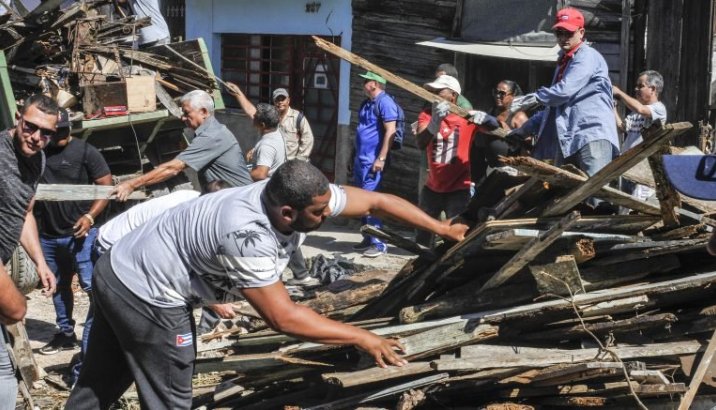 Photo: José Raúl Rodríguez Robleda/ Trabajadores.
Photo: José Raúl Rodríguez Robleda/ Trabajadores.
The best of Cuba has blossomed like a flower under the light of homes without roofs
People are the soul and muscle of every civil society. Cuba is not the exception and it is proving it like never before.
The tornado that severely affected four municipalities of the Cuban capital on January 27, with its path of death and destruction, has put this fact on display.
As is their duty, many institutions and government bodies have jumped in head first into the restoration of the affected area’s electricity and water service. Many of the affected citizens have recognized the effort and in fact have stated that the workers “did not sleep.”
Public authorities have also facilitated the sale of materials for the reconstruction of houses, with a significant cut in prices, while others are fully subsidized by the state, depending on the person’s economic-situation. For the more than 200 Cubans who have lost their homes, state premises are being converted into apartments that will be turned over to these people as soon as possible. There’s also food being provided at no cost and for those who are facing a total disaster. Others who are facing less damage costs have been reduced.
We have seen the government and its structure work and present during this recovery period, and demanding effective promptness and supervising tasks in the affected places. We have seen high ranking officials and ministers appear on a daily basis.
No one on the Island is unaware of the catastrophe. And this is where suddenly persons of all stripes and places have appeared, there to help in a show of solidarity the media calls “the people.” They are compatriots from all over the country bound strong and with no borders, some offering a hug, others bread to the many who have been overwhelmed by this natural disaster.
Everyone has shown up: the self-employed, private entrepreneurs, whatever you want to call them, all working, delivering food, clothing, indispensable items or just cleaning the rubble; there are taxi drivers providing their vehicles, free of charge, to carry the load to its destination. There you will also find university students and people from a wide variety of institutions from the world of culture who, without being called, are there to share what they have and alleviate the pain of more than 2,000 Havana residents that nature, in just a few seconds, destroyed the homes and the everything they had in life of those who inhabited them.
There are those who have expressed worry because of the mobilized solidarity that has sprung naturally from “common” people and autonomous institutions. But they do not usurp the government’s or state’s responsibilities. This brotherhood and sisterhood is all good because it shows that the most precious values of our human condition have not been lost in the heat of so many problems. The best of Cuba has blossomed like a huge flower under the light of homes without roofs.
There is no need for permission in order to express one’s generosity — that’s clean, simple, spontaneous, and honest. A hug does not require authorization, neither does the distribution of bread and the effort in reconstruction.
The sight of official organisms and institutions working and sweating together with normal everyday citizens working as one bring forth the harmony that these moments and those to come require.


